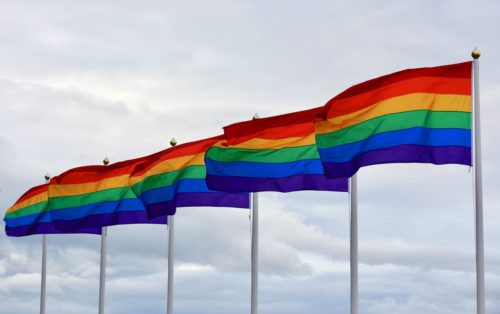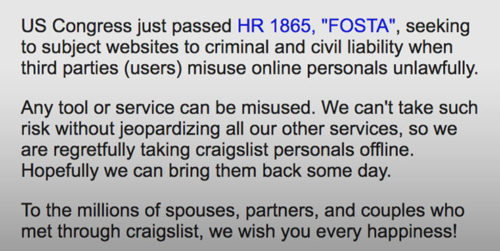Pagan Perspectives
Today’s column comes to us from Storm Faerywolf, whose column covers the intersection of Paganism and queer identities. Storm is a professional author, experienced teacher, visionary poet, and practicing warlock, and is author of “Betwixt & Between” and “Forbidden Mysteries of Faery Witchcraft.” He lives with his two loving partners in the San Francisco Bay area and travels internationally teaching the magical arts. For more, visit faerywolf.com.
The Wild Hunt always welcomes submissions for the weekend section. Please send queries or completed pieces to eric@wildhunt.org.
This past October, Facebook implemented updates to its policies in an effort to restrict sexual content on its site, a move that has drawn ire from certain corners of the LGBTQ+ community. The social media giant says that its policies are necessary for “encouraging expression and creating a safe environment.” But some queer groups and businesses are raising the alarm of censorship and discrimination.
The language used in their updated policies is quite specific about what content they will not permit. Excerpted here from their “Community Standards,” prohibited content is defined, in part, as:
- “Content that attempts to coordinate or recruit for adult sexual activities”
- “Vague suggestive statements”
- “Sexualized slang”
- “Using sexual hints such as mentioning sexual roles, sex positions, fetish scenarios, sexual preference/sexual partner preference”
Also prohibited is content that “offers or asks for other adult activities,” specifically including “[p]artners who share fetish or sexual interests.” Effectively, this could mean that a bar or club promoting a fetish-themed night could be barred from doing so, even though the event itself is not offering sex to its patrons.

[Pixabay].

From the now defunct personals section of Craigslist.
Most recently blogging giant Tumblr has followed suit, and come December 17 all adult content will be banned on that site, leaving the obvious question: what will be left? Tumblr, admittedly, had a porn problem, and not the apparent fact that half their users seemed to be on the site explicitly for that purpose. Specifically, they had a child porn problem, which many believe is what led Apple to recently remove the Tumblr app from their app store. Instead of Tumblr focusing their efforts on policing content for legal breaches of sexual content, it would appear easier to simply ban that type of content altogether, which suddenly leaves some legitimate (and perfectly legal) communities without a means to organize. Tumblr had been a sort of refuge in the social media world for sexual minorities and kinksters, many using the service for education and community outreach. Now many are left wondering where they will go to maintain those community connections, so carefully curated over the years. Tumblr may not intend for their actions to reach any further than their own service, but what amounts to the deplatforming of entire swaths of a philosophical divide will have intense ramifications for culture and the expression of human sexuality.
While the argument has been framed by the blogging giant as a move toward improving their community standards it is worth noting that the service still allows access to material that is violent or racist, despite having policies against hate speech. While writing this I was easily able to find Nazi propaganda, anti-homosexual threats of violence, and speech demeaning to women, while searches for explicit adult material appears to have been blocked entirely. This reveals that Tumblr has been effectively motivated to correct what they see as a “sex problem” but are content to largely ignore what many of the rest of us see as a “hatred problem”.
On the surface, these recent implementations may seem to be reasonable in their attempt to curtail offensive or even abusive material, but the reality is far more nuanced. Under Facebook’s new terms, identifying oneself as a top or bottom could be considered a violation, as would simply talking about sex. And with Facebook’s prior history of disproportionately applying the rules against queer people, it doesn’t seem so far-fetched to imagine that discrimination is playing a role.
Michael Stokes, a well-known photographer of the (mostly) male form, recently penned a piece for The Advocate in which he detailed his Tumblr and Facebook censorship woes. In 2013 Stokes’ Facebook account was suspended because he posted one of his photographs, a nude war veteran, who is also an amputee. Though it did not ostensibly violate the site’s terms at the time (there was no visible genitalia and the photograph in no way depicted a sexual pose) the image was deleted, and he was locked out of his account. After a public outcry and inquiries from the media the picture was reinstated, only to be deleted again and Stokes account suspended for six months. Stokes also received numerous abusive messages and threats from other social media users. Stokes says that he reported them to the social media services, but that nothing was ever done.
Facebook uses a combination of computer algorithms and human workers to determine which images and posts are in violation of its rules. This is, presumably, because we have yet to invent an algorithm that can distinguish been the male and female nipple. But with actual humans making these determinations, we are also at the whim of their own biases. Several of Stokes’ photos had been flagged for removal, though they did not seem to violate the site policies as stated. Even in cases in which there was no nudity at all (such as with many of his photos of shirtless men, or the two police officers who were shown about to kiss while fully clothed) photos were still flagged as having violated the rules, curtailing Stokes’ ability to advertise to his market. Stokes says that he has never posted photographs of full-frontal nudity. His work is hardly obscene and is arguably less scandalous than many images of the female form to be found unreported on the networking site, leaving the inescapable notion that these policy changes are being disproportionately directed toward the queer community.
Stokes points out that traditionally, nude images have been reserved for male viewing pleasure, and so when the subject of the image is male, this leads to the (erroneous) conclusion that the image is therefore inherently homoerotic. With individual human beings and their human biases drawing the lines of what is accepted and what is not, we find a scenario in which the rules are not evenly applied, especially when the biases at play might be unconscious.
Facebook has stated that its policies are fair and help provide a safe space free of discrimination, but others have pointed out a potentially disturbing pattern. And it’s not only due to sexual content or even their most recent policy updates. Also in October, the Washington Post reported that several LGBTQ+ groups were upset at having found their Facebook ads blocked by the social media company for being “political,” despite not having any explicitly political aims or leanings. These included a Spanish-language social group, a beach concert, a pride-themed night at a baseball game, a list of senior-friendly housing options in Texas, and a youth prom, to name a few. None of these groups were advocating politically, yet all were deemed political and the common denominator between them all was being LGBTQ+ in nature. Facebook has said that they were not targeting LGBTQ+ groups but have declined to explain why these groups had been blocked, to begin with.
Facebook and Tumblr are not alone in the ongoing homogenization of online community standards. Earlier this year, queer users of YouTube noticed that their videos were being filtered, regardless of their actual content. The video service later apologized for the incident, stating that some videos had been incorrectly flagged by their automated system. Months later, queer users again saw suspicious activity, this time in the form of anti-LGBTQ+ ads that were being attached to their videos. YouTube told Forbes magazine at that time that they were “looking at ways to improve” their policies.
With more and more online services consolidating under increasingly fewer banners, the opportunities for diversity and freedom of expression are becoming more and more scarce. YouTube is owned by Google, and Instagram, the photo-sharing service, was purchased by Facebook in 2012 who also purchased WhatsApp in 2014. This trend toward media consolidation indicates that it may become progressively more difficult for queer people to find spaces for online communications that are actually free, forcing us once again into the closet, at least where social media is concerned. Though, if our history is any indication, we will find new ways to express ourselves and to communicate our needs and desires to others in our community, much as our queer forebears did with coded speech and the “hanky codes,” which allowed queer people to communicate their sexual desires without arousing the suspicion of the straight oppressors. Perhaps, as the song says, “it’s all just a little bit of history repeating.”
[Editor’s note: A previous version of this story used different artwork.]
The views and opinions expressed by our diverse panel of columnists and guest writers represent the many diverging perspectives held within the global Pagan, Heathen and polytheist communities, but do not necessarily reflect the views of The Wild Hunt Inc. or its management.
The Wild Hunt is not responsible for links to external content.
To join a conversation on this post:
Visit our The Wild Hunt subreddit! Point your favorite browser to https://www.reddit.com/r/The_Wild_Hunt_News/, then click “JOIN”. Make sure to click the bell, too, to be notified of new articles posted to our subreddit.
